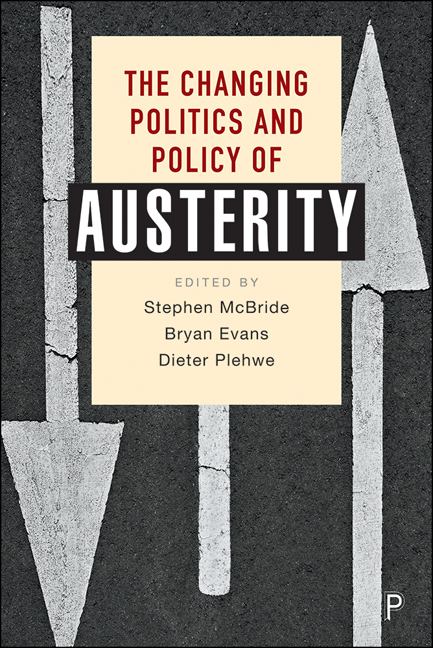Book contents
- Frontmatter
- Contents
- List of figures and tables
- Notes on contributors
- Acknowledgements
- Introduction
- PART I Austerity and the promotion of the private
- PART II Coping and casualties: labour and the social
- PART III Beyond coping: protest, pathologies and the development of real alternatives
- Conclusion
- Index
6 - Politics as an alternative to constitutionalization
Published online by Cambridge University Press: 13 May 2022
- Frontmatter
- Contents
- List of figures and tables
- Notes on contributors
- Acknowledgements
- Introduction
- PART I Austerity and the promotion of the private
- PART II Coping and casualties: labour and the social
- PART III Beyond coping: protest, pathologies and the development of real alternatives
- Conclusion
- Index
Summary
In the long period of neoliberal hegemony there have been marked and overlapping transfers of political authority: from the national to international levels; from institutions where popular sovereignty might be exercised, to opaque technocratic, expert bodies where complex networks of public and private actors arrive at decisions; and, from public authorities to private ones. These processes have often been termed ‘depoliticization’, a term that connotes the removal of issue areas from the scope of normal politics and their transfer to geographically, or institutionally remote and unaccountable decision-making bodies. Despite the label, such processes are, of course, highly political, and the type of ‘depoliticization’ achieved is only with respect to democratic and popular impact (McBride and Schnittker 2021). The periodic crises experienced in the neoliberal era have provided opportunities to intensify these trends or, potentially at least, reverse them.
Austerity, defined as fiscal consolidation, public sector structural reforms and flexibilization of labour markets, presents a common thread among capitalist states in the neoliberal era and received particular prominence as a, slightly delayed, response to the economic crisis following 2007– 08. It had long been a central component of neoliberal ideology, and its associated policies considered as a capital accumulation strategy (Harvey 2005). Viewed as a policy response to the 2007– 08 financial crisis austerity has a number of dimensions extending to fiscal matters of budget balances and debt ceilings, repurposing and privatizing, or marketizing as much of the public sector as possible, and restructuring social and labour market policies. The language of balanced budgets and debt limits is presented as a contribution to sustainable public finance, restructuring the public service on market lines is seen as a means of enhancing efficiency, and labour market reform as a means to competitiveness (see Whiteside et al 2021).
The defects of austerity received much attention (Gough 2011; Guajardo et al 2011; Blyth 2013; Herndon et al 2013) yet the critics made little progress in reversing the priorities of states or international organizations. Indeed, the needed policy debate was partially stifled by institutional measures intended to ‘depoliticize’ debates on economic policy and render a variety of policies subject to the application of permanent and fixed rules. In the process democracy was diminished and a prerequisite of good policy undermined.
- Type
- Chapter
- Information
- The Changing Politics and Policy of Austerity , pp. 127 - 146Publisher: Bristol University PressPrint publication year: 2021



